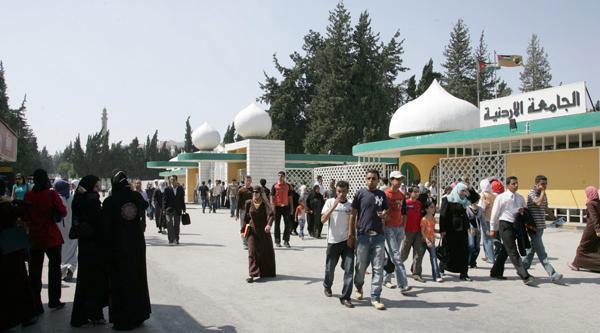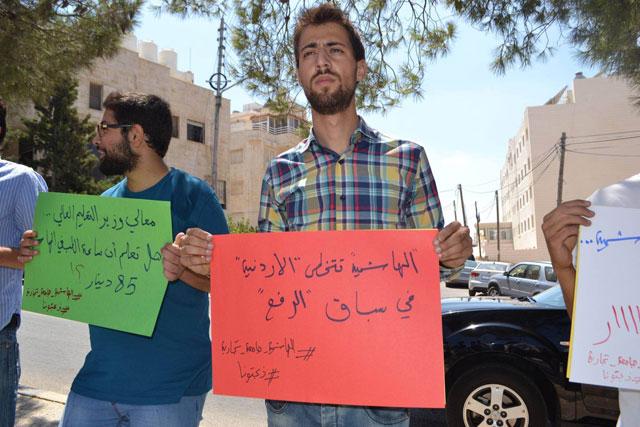You are here
UJ students call for boycotting upcoming semester’s registration following fee increase
By Suzanna Goussous - Jul 21,2018 - Last updated at Jul 22,2018

AMMAN — The University of Jordan’s (UJ) decision to raise registration fees announced on Thursday sparked outrage among students, who called for boycott and protests on campus to demand the revocation of the decision.
The decision, signed by the university’s Board of Trustees in December 2017, requires students to pay an additional JD10 per semester for services, which the university said would be added to students’ health insurance services and is separate from the regular tuition fees paid for credit hours.
Head of the media department at UJ Haya Hourani said that the decision of the additional fee was taken due to the lack of funding for public universities, which has created financial problems for the UJ over the past few years.
She noted however that the university’s acting president, Emad Salah, will hold a meeting on Sunday with the Board of Trustees to further discuss the decision and ways to find a middle ground with the students.
Heba Albaz, German and English languages student at the UJ, said: “If students do not protest against this decision, it will pave the way for similar decisions in the future that will be used as solutions for the university’s financial issues.”
“This time, it is JD10, next time it will be more; this strategy will be adopted if we don’t oppose it,” Albaz told The Jordan Times.
Before the recent hike, the registration fees for the regular programme amounted to JD48 per semester, while the parallel progamme’s registration fees were around JD58, and the post-graduate programme’s fees reached JD108, according to the fourth-year student.
Under the new measure, an additional JD10 will be added to each programme’s registration fees.
Ward Allan of UJ’s Al Tajdeed (Renewal) Bloc said students only found out about the fee hike when they accessed the online registration system, as they have to prepare for paying tuition fees in order to get access to the system ahead of the registration period next week.
“The student blocs and union were not aware of this decision. There are no valid points to explain the raise in the registration fees,” he added. “The services provided at the clinic do not meet the standards. The union held several meetings, and, yet, no response was received concerning this issue.”
“This is only the beginning; it indicates that the university’s administration plans to sign more decisions that resort to students’ pockets as the easiest solution,” Allan added, explaining that the university had already increased the prices at the cafeterias on campus and the university’s restaurant.
A member of Ahl Al Himmeh bloc at UJ’s student union, Malek Noubani said students have witnessed over the past few years an increase on all services provided on campus.
Noubani said the strategy is “not new” as many kiosks on campus have been “privatised” in the recent years, “without providing improved services to students”.
“There is no valid explanation for the rise. The university has been adopting the same health insurance programme since the 1960s,” the engineering student said.
Zaid Khatib, the student union’s vice president, said the union has been receiving several complaints about the clinic at UJ, adding that students “have to wait for three to four hours to get medication or to be referred to the university’s hospital”.
“Three years ago, the university announced its decision to raise the tuition fees for parallel and postgraduate programmes, which led us to start the open-ended protest on campus until the decision was reversed. This time, the decision affects all programmes; the reaction will be on a wider scale,” he told The Jordan Times.
Fakher Daas, coordinator of the National Campaign for Defending Students’ Rights, Thabahtoona, said the rise in fees coincides with the university’s decision to grant campus guards the judicial police status, which “limits student movements that demand basic rights” from protesting such decisions.
Daas added that if the decision is enforced, students “will face similar unjust decisions in the future”, adding: “Students should not be responsible as the government cuts the aid provided to public universities… many families cannot afford the added fee.”
Students launched a campus-wide campaign to boycott registration for the autumn semester and called upon students to take part in a protest organised on Sunday at 1pm in front of the presidency building on campus to demand the total reversal of the decision.
Related Articles
AMMAN — The University of Jordan (UJ) has cancelled a decision to increase the health insurance fees by JD10 per semester for all programmes
AMMAN — Suspensions and detentions of students who participate in activities to defend their rights or express their ideas has led to
AMMAN — Students at the Zarqa-based Hashemite University staged a sit-in on campus on Thursday to protest increases in post-graduate tuition



















